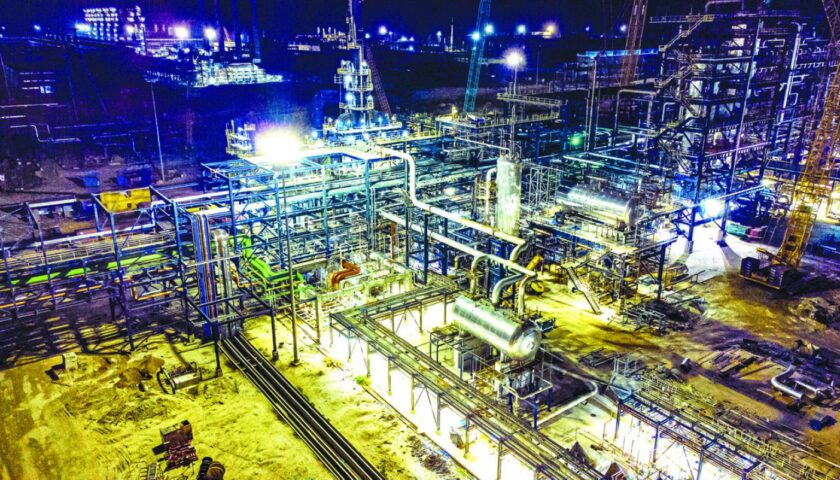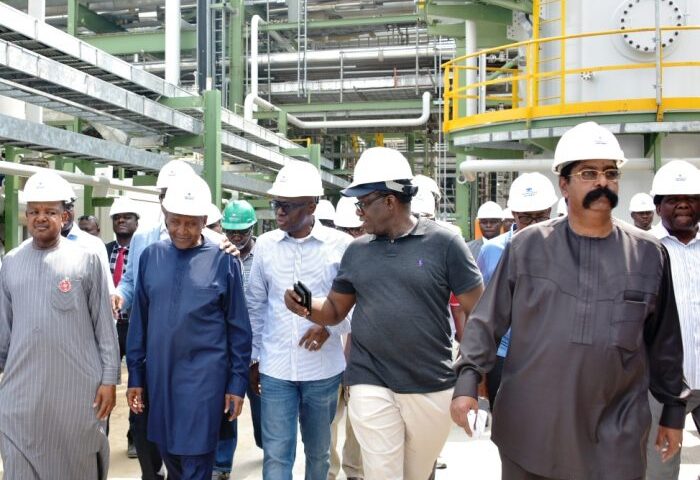By NewsBits
The local production of Premium Motor Spirit, otherwise known as petrol, by Dangote Refinery, Port Harcourt Refining Company and others in Nigeria is not going to change the pump price of the commodity, the Nigerian National Petroleum Company Limited has said.
The NNPCL’s Group Chief Executive Officer, Mele Kyari, who disclosed this during an interview on Arise television in Abuja on Thursday, stressed that the notion that petrol prices would reduce once the country starts domestic production was false. Kyari confirmed that the Dangote Refinery, which was inaugurated on May 22, 2023, by former President Muhammadu Buhari, would start pushing out products by the end of July and early August.
He also stated that the Port Harcourt Refinery would be delivered by the end of the year, adding that the facility was expected to further boost local production of petrol. But Kyari declared that despite the volume of petrol being expected from these facilities, the cost of the commodity would not reduce, regardless of the fact that the product was produced locally.
“There is a notion that if the product is processed locally, prices will reduce. Let me make it clear that it is not going to change anything. If you produce locally, the refineries will also input the cost of production and other things and it will be sold at the current price.
“There will also be no subsidy when local production starts because there is no cash-to-back subsidy, this country no longer has the resources to continue with subsidy,” Kyari stated.
Fuel Queues
Speaking on when the fuel queues being witnessed across the country would clear, during another interview on Channels TV, the NNPCL boss said the queues would not exceed Saturday.

“I don’t see it staying beyond another day or two, maximum. It can actually be on Saturday. We have supplies. The key trouble with the PMS system is supply, but I have supplies.
“There are over 810 million litres of PMS in depots, tanks and fuel stations across the country, so you don’t have the problem of transferring those from marine to land, you already have them on the ground,” he stated.
He validated the PMS pricing document for various states that trended on Wednesday on the internet, stating that the document was from the NNPCL.
“You have seen a document in the space out there. Every company does this. It is a marketing document. It was not a price announcing document, every company keeps this record and adjusts it appropriately on the basis of changing conditions in the market.
“So, what you saw was just an internal company document that found its way into the internet. It is an NNPC document, but it was not intended to be an announcement and is not an announcement, because it can change the next day,” Kyari stated. On whether there was enough product in-country, he said, “Today I have 1.8 billion litres of PMS and that means that if we don’t do anything, I’ll have sufficient fuel for the next 30 days in my hands.
Kyari explained that the company had over 800 million litres of petrol on land, stored in filling stations, tank farms and depots, while its total stock for both marine and land stood at about 1.8 billion litres. “But, of course, the way we supply is not this way, so we maintain this level of supply consistently. That means you will see the arrival of products every day so that you continue to maintain that level of safety.”
‘Subsidy Not Realistic’
Speaking to journalists after a meeting with the National Chairman of the All Progressives Congress, Senator Abdullahi Adamu, at the party secretariat in Abuja on Thursday, Kyari revealed that the administration of President Bola Tinubu had concluded arrangements to have one of the four refineries repaired and operating at an optimal level before the end of the year.
The NNPCL boss argued that it was no longer justifiable to continue subsidising the commodity given the high opportunity cost the Federal Government was suffering from funding it. Kyari, who was received by the APC chairman and members of the National Working Committee at about 12.30 pm, confessed that the country could no longer sustain the expensive subsidy regime.
According to him, over 38 per cent of the total fuel distributed in the country was consumed by Lagos, Abuja, Kano, and Rivers. Kyari explained that following the hike in pump price and the resultant effect on commercial fare, the president was working out some palliative measures to ease the pains of Nigerians.
He also added that there was an ongoing process of rehabilitation to ensure one of the refineries was ready this year. Kyari lamented that despite its N2.8tn indebtedness to the NNPCL, the Federal Government had yet to release funds for 2022 and 2023 subsidies.
He said, “There was a subsidy in 2022 but in 2023, not a single naira was provided for the purpose. And ultimately while we held back our fiscal obligations, we still have a net balance of over N2.8tn that the federation should have given back to the NNPC.
‘’For any company, when you have negative N2.8tn, there is no company in the whole of Africa that will lend to you. You cannot have receivables. The provision of subsidy is there but absolutely there is no funding for it. It means it is only on paper. It doesn’t exist.
“We can no longer bear it. If we continue, we will run into defaults and the default of NNPC is the default of Nigeria. Once NNPC goes into default and liquidity, it affects every borrowing done by the country, even the sub-nationals. Your lenders will come back to you and say your country can no longer pay.
‘’The only way you can stop this is to stop this conversation around subsidy. It is why Mr President announced that the subsidy is gone. In 24 hours, the bond market appreciated. It is nothing else other than the statement around subsidy and balancing of the apex market. These two elements are a major concern for every investor all over the world. Every partner that we have is worried about.’’
Inflation Expected
Kyari acknowledged that the price increase would trigger inflation, noting that the market forces would determine what happens subsequently.
He noted, “Before today, the average subsidy level was N400bn every month. There is nothing anybody can do about it. There is this common argument that the masses will suffer. I agree that once you increase prices of this proportion, as it has happened, it will have an impact on inflation. There is no doubt about it. The market determines what happens next. Even inflation in many countries goes up when you have economic indices become difficult.

“Mr President’s target is to have seven per cent growth of GDP. You cannot have it if you have this disruption in your demands and consumption pattern. Very many of us here have at least two cars in our houses including myself. When you buy fuel of 100 litres in an SUV, you are literally subsidising three litres with N100 for all of us.
‘’Even the consumption itself is clearly skewed in locations and states where the level of economic activities are higher than the others. It is very understandable and that is why people can afford it in Abuja, Lagos, Port Harcourt, and Kano. So over 38 per cent of the total fuel distributed in this country ends up in these places. All the other parts of the country suffer for it and you can see the relativity.’’
Kyari submitted that the price at which petrol was being sold now is the current market price of the commodity.
‘’The price you are seeing today at our stations is the current market price of the commodity and what this means is that prices in the market can go down at any time and the market will adjust itself. The beauty of this is that there will be a new entrance because oil marketing companies now will want to invest, they have been reluctant to come in because of the subsidy,’’ he stated.
With the latest development, the NNPCL chief said the market would regulate itself, adding that oil marketing companies could now import products or buy locally produced ones and take them into the market and sell at commercial prices.
He added, ‘’You would see competition even with NNPCL, and by law, the company can’t do more than 30 per cent of the market going forward. So, competition will surely come in and definitely, the market will regulate the price itself. It is an instantaneous price and in two weeks, you will see the adjustment that is happening in many jurisdictions.
‘’But ultimately, you would see changes in price downwards and that is very likely. Efficiency will come in and every lacuna in the sector will be taken out because of the new situation





